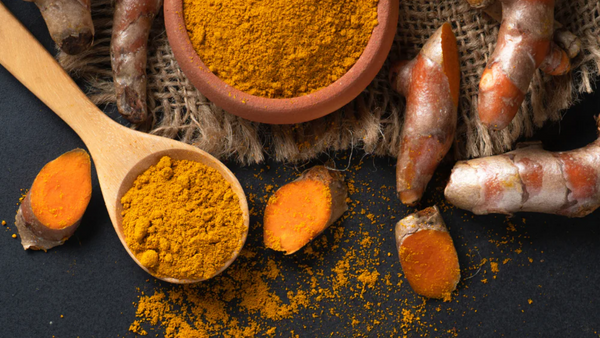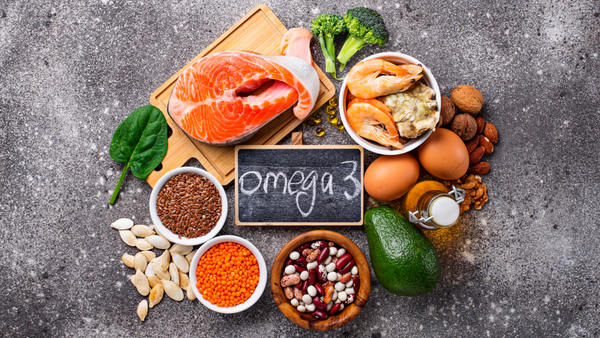Like vitamins A, D and E, vitamin K is one of the fat-soluble vitamins . It has important functions in blood clotting and bone metabolism .
Here you can find out what vitamin K does in the body and which foods contain a lot of vitamin K.
We will also explain how to recognize a defect and how to fix it.
At the end of the article there is a 15% voucher waiting for you. This is valid for all our vitamins that contain K2!
What is vitamin K?
Vitamin K is an essential nutrient that we must obtain from our diet. There are different forms of vitamin K: vitamin K1 and vitamin K2 .
Plant foods, especially green leafy vegetables such as spinach and cabbage, are very rich in vitamin K1 (phylloquinone).
Vitamin K1 has a significantly lower bioavailability than vitamin K2. This means that the body cannot absorb and use it as well. Vitamin K2 can be produced from vitamin K1 by bacteria in the intestine.

There are many different forms of vitamin K2. The two main forms are particularly important in nutrition:
- Menaquinone-4 (MK-4) : Found mainly in animal foods such as dairy products, eggs and meat
- Menaquinone-7 (MK-7) : By far the best source of MK-7 is fermented soy products, such as the traditional Japanese food natto.
Why is vitamin K important?
Vitamin K plays an important role in blood clotting and is important for vascular health. [1]
People with a vitamin K deficiency have an increased risk of atherosclerosis (so-called hardening of the arteries). Conversely, there is scientific evidence that supplementing with vitamin K2 can stop the progression of the disease. [2]
Vitamin K is also important for bone health . Vitamin K2 activates the bone hormone osteocalcin . This hormone binds calcium and ensures that calcium is absorbed into the bones. Osteocalcin strengthens the bones and the osteocalcin level in the blood is considered a marker for assessing the risk of osteoporosis (bone loss) . [3] Vitamin K therefore contributes to the maintenance of bones and teeth. [4]

Incidentally, vitamin K also needs vitamin D to function. Vitamin D supports vitamin K2 in the absorption of calcium into the bones . [5] When taking a dietary supplement, it is therefore advisable to use a vitamin D3/K2 combination product .
Studies also indicate that vitamin K2 has an anti-inflammatory effect. Taking vitamin K2 lowers the inflammatory marker CRP ( C - Reactive Protein ) in the blood. [6]
Vitamin K daily requirement
According to the German Nutrition Society (DGE), an adult's daily requirement of vitamin K is 60-80 ug . [7] Men have a slightly higher requirement than women, and people over the age of 50 also have an increased requirement. However, the DGE does not differentiate between vitamin K1 and K2 in its recommendation.
Vitamin K deficiency symptoms: How to recognize it
A vitamin K deficiency causes a number of typical symptoms . However, these symptoms can also have other causes and are not necessarily due to a vitamin K deficiency. A deficiency can only be diagnosed by a doctor. This is usually done with the help of a blood coagulation test . [8]
Common symptoms of vitamin K deficiency include: [9]
- high susceptibility to bruises and hematomas
- Nose and gum bleeding
- very dark, bloody stool
- Difficulty concentrating
- Weakness and lack of motivation
- high susceptibility to bone fractures
Causes of vitamin K deficiency
A vitamin K deficiency occurs when either not enough vitamin K is consumed through food or there are problems with vitamin K absorption.
Since vitamin K is fat-soluble, disorders in fat metabolism can impair vitamin K absorption. Intestinal and liver diseases can also make it difficult to absorb the vitamin and thus promote a deficiency. [10]
Similarly, taking certain medications, such as antibiotics and antiepileptic drugs , can lead to a vitamin K deficiency over time. [11]
A vitamin K deficiency is not uncommon. 8-31% of adults have a deficiency of the vitamin. However, it is rarely so severe that it leads to blood clotting disorders. [12]
Foods with vitamin K
Vitamin K is found in both plant and animal foods . Green leafy vegetables are very rich in vitamin K1. However, you have to remember that the body cannot use vitamin K1 very well. That's why you should not only pay attention to how much vitamin K a food contains, but also what form it comes in.
Since vitamin K is fat-soluble, you should always make sure to eat vitamin K-rich foods along with some fat . This is especially important with plant-based foods, as animal foods naturally contain the required amount of fat. One study has shown that the absorption of vitamin K from vegetables can be tripled by adding fat! [13]
However, vitamin K is very heat-stable , so no significant amounts of vitamin K are lost during cooking.
In the table you will find the best plant and animal sources of vitamin K. The information is in ug/100g.
|
Herbal |
Animal |
|
Natto: MK-7 (1000) [14] |
Cheese (Emmental): MK-4, MK-9 (45) [15] |
|
Cabbage: K1 (817) [16] |
Egg yolk: MK-4 (33.5) [17] |
|
Cress: K1 (542) [18] |
Salami: MK-4 (11,3) [19] |
|
Spinach: K1 (483) [20] |
Chicken: MK-4 (8,9) [21] |
|
Radicchio: K1 (255) [22] |
Whipped cream: MK-4 (4.5) [23] |
Correct vitamin K deficiency
If you are slightly deficient in vitamin K, you can focus more on foods rich in vitamin K. However, an acute vitamin K deficiency cannot be easily remedied with vitamin K from food. In this case, it makes sense to counteract it with a high-quality dietary supplement .
Not all vitamin K is the same. For this reason, you should pay attention to which form of vitamin K the preparation contains. Basically, high-quality vitamin K preparations always contain vitamin K2. It is often found as MK-4 or MK-7 . Both have a high bioavailability and can be used well by the body. If you value plant-based vitamin K, you should buy a preparation with MK-7.
Vitamin K2 from Viktilabs
Viktilabs' vitamin K2 contains MK-7, which is produced from farnesol and geraniol . Farnesol and geraniol are plant compounds that are found in rose oil, for example. It is dissolved in MCT oil and coconut oil . This ensures that the fat-soluble vitamin is well absorbed. It is also packaged in a light-protected manner, as vitamin K is very sensitive to light.
It also contains no synthetic binding agents or artificial preservatives and is gluten and lactose free. It is developed in Germany according to the highest quality standards.
Conclusion: Vitamin K is not the same as Vitamin K
There are many foods that are rich in vitamin K. However, the food labels are often misleading because they do not distinguish between vitamin K 1 and vitamin K2.
A vitamin K deficiency is not uncommon. To correct or prevent a vitamin deficiency, a high-quality vitamin K2 preparation is suitable.
Here you get your 15% voucher code on all our vitamins containing K2
Simply copy this voucher code
VITAMINK15+V
and enter it at the checkout.
Click here to get our K2 vitamins
[1] https://www.ncbi.nlm.nih.gov/pmc/articles/PMC4600246/
[2] https://www.ncbi.nlm.nih.gov/pmc/articles/PMC4052396/
[3] https://www.ncbi.nlm.nih.gov/pmc/articles/PMC4576601/
[4] https://www.ncbi.nlm.nih.gov/pmc/articles/PMC4600246/
[5] https://www.ncbi.nlm.nih.gov/pmc/articles/PMC5613455/
[6] https://www.researchgate.net/publication/232813235_Vitamin_K2_administration_is_associated_with_decreased_disease_activity_in_patients_with_rheumatoid_arthritis
[7] https://www.dge.de/forschung/referenzwerte/vitamin-k/?L=0
[8] https://labtestsonline.org/conditions/vitamin-k-deficiency
[9] https://www.ncbi.nlm.nih.gov/books/NBK536983/
[10] https://www.ncbi.nlm.nih.gov/pmc/articles/PMC6683014/
[11] https://pubmed.ncbi.nlm.nih.gov/2276882/
[12] https://www.ncbi.nlm.nih.gov/books/NBK536983/
[13] https://pubmed.ncbi.nlm.nih.gov/8813897/
[14] https://ods.od.nih.gov/factsheets/VitaminK-HealthProfessional/#h3
[15] https://pubmed.ncbi.nlm.nih.gov/17699024/
[16] https://nutritiondata.self.com/facts/vegetables-and-vegetable-products/2461/2
[17] https://www.karger.com/Article/Abstract/54147
[18] https://nutritiondata.self.com/facts/vegetables-and-vegetable-products/2437/2
[19] https://www.karger.com/Article/Abstract/54147
[20] https://nutritiondata.self.com/facts/vegetables-and-vegetable-products/2626/2
[21] https://www.karger.com/Article/Abstract/54147
[22] https://nutritiondata.self.com/facts/vegetables-and-vegetable-products/3018/2


















